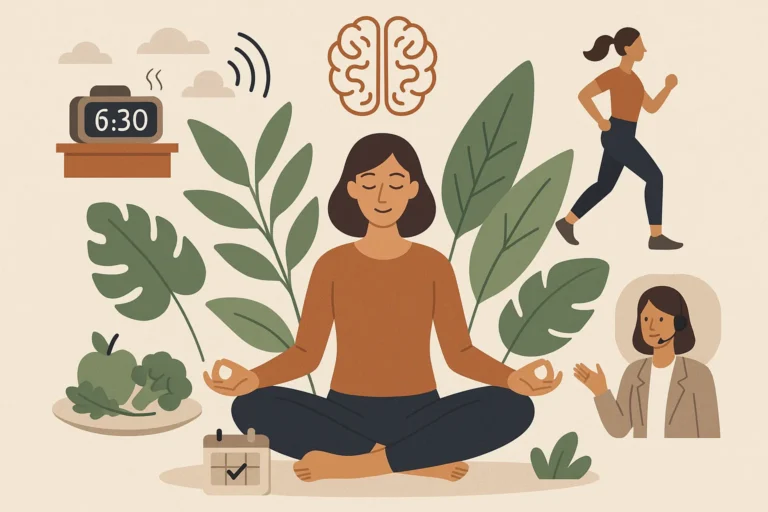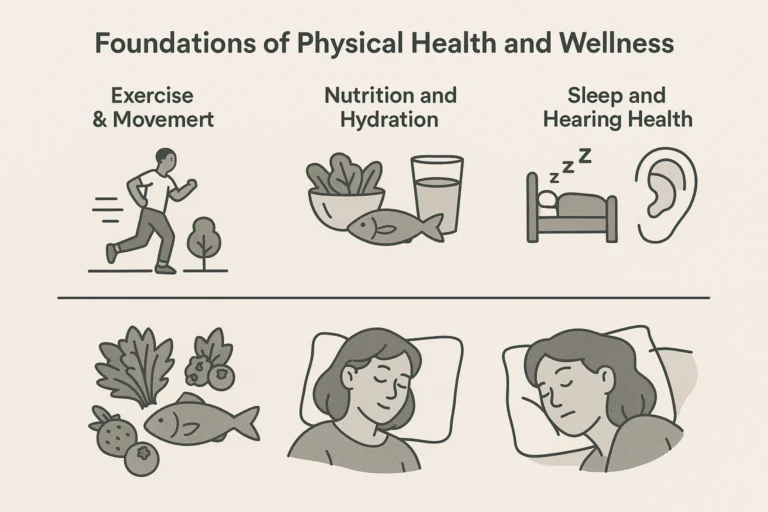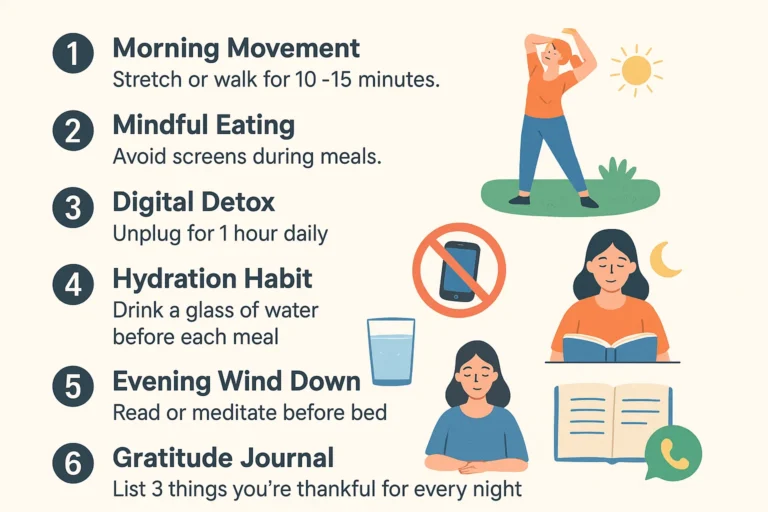Introduction:
Modern life is busy, noisy, and often overwhelming—causing many to feel stressed, mentally drained, and physically worn out. The problem? Most people don’t know how to build a sustainable wellness lifestyle that balances both body and mind. So how can someone create lasting change that improves their mental wellness, enhances physical health, and prevents burn out?
This blog explores a clear, science-backed roadmap to building your own wellness lifestyle. It answers key questions: What areas should you focus on? How do you keep consistent? And what role do professionals like a wellness coach play in helping you stay on track?

What Is a Wellness Lifestyle and Why Does It Matter?
A wellness lifestyle is a proactive and intentional approach to living that supports holistic health. It’s not just about hitting the gym or eating green salads—it’s about integrating positive habits that enhance your physical wellness, mental and emotional health, and social well-being over the long term.
Recent stats back this up: According to the Global Wellness Institute, the global wellness economy reached $5.6 trillion in 2023, with more individuals investing in mental fitness, sleep health, and emotional balance than ever before [source: GWI].
Key benefits of living a wellness lifestyle include:
- Reduced risk of chronic diseases
- Enhanced mental clarity and focus
- Improved sleep quality
- Lower rates of burn out
- Increased happiness and life satisfaction
A wellness lifestyle matters because it gives individuals control in a chaotic world—empowering them to feel balanced, energized, and emotionally equipped to thrive.

Foundations of Physical Health and Wellness
Foundations of Physical Health and Wellness
One of the cornerstones of a wellness lifestyle is physical health. This includes sleep, nutrition, exercise, and regular health check-ups.
✔ Exercise & Movement
Movement is essential. The World Health Organization recommends at least 150 minutes of moderate aerobic activity per week. Whether it’s walking, cycling, or yoga, consistent activity enhances physical wellness, supports heart health, and boosts energy levels.
✔ Nutrition and Hydration
Eating nutrient-rich, whole foods can prevent inflammation and stabilize mood. Consider reducing processed foods and sugar, and instead focus on:
- Leafy greens, berries, fatty fish
- Hydration with 8–10 glasses of water a day
✔ Sleep and Hearing Health
Sleep impacts everything from immunity to memory. Aim for 7–9 hours of rest each night. But hearing health is also often overlooked. Chronic exposure to loud environments—especially via headphones—can lead to long-term damage and fatigue, contributing indirectly to burn out. Include ear care in your regular health routine.

Strengthening Mental and Emotional Health
In a world constantly pushing for more productivity, mental stability is non-negotiable. Mental wellness involves managing emotions, thoughts, and behaviors to cope with stress effectively.
✔ Recognize Signs of Burn Out
Emotional exhaustion, reduced performance, and detachment are common indicators. If left unchecked, they can sabotage your wellness goals. Make time for rest and set boundaries—especially during “hustle” seasons.
✔ Incorporate “Wellness Wednesday”
Start with small rituals. Designate a weekly Wellness Wednesday where you focus on one element of emotional or physical wellness. This could be:
- Journaling for gratitude
- A nature walk without your phone
- A 20-minute breathing or meditation session
✔ Connect with Mental Health Experts
Sometimes, self-care alone isn’t enough. Speaking with a psych professional or wellness coach can offer valuable support, especially during transitions or challenging periods.

Role of a Wellness Coach in Long-Term Success
Building a consistent wellness lifestyle can be difficult without accountability. That’s where a wellness coach steps in.
What Does a Wellness Coach Do?
They help individuals:
- Set achievable health goals
- Build realistic routines
- Track progress over time
- Offer guidance during setbacks
Coaches often work across various dimensions—covering everything from physical wellness to mental and emotional health, ensuring a truly holistic plan.
“People with a coach are 3x more likely to stick with their wellness routines long-term.” — International Coaching Federation (ICF)
A good coach helps build lifestyle architecture that fits your life, not forces you into rigid models.

Practical Habits to Sustain a Wellness Lifestyle
Creating a wellness lifestyle isn’t about overhauling everything at once—it’s about consistency and small changes. Here are 7 evidence-based habits to start today:
- Morning Movement: Stretch or walk for 10–15 minutes.
- Mindful Eating: Avoid screens during meals.
- Digital Detox: Unplug for 1 hour daily.
- Hydration Habit: Drink a glass of water before each meal.
- Evening Wind Down: Read or meditate before bed.
- Gratitude Journal: List 3 things you’re thankful for every night.
- Social Check-In: Message or call a friend weekly.
These routines may seem small, but when practiced consistently, they create long-lasting change.

Final Thoughts
A wellness lifestyle isn’t a trend—it’s a commitment to self-care, balance, and intention. By addressing key pillars like physical health, mental wellness, and emotional clarity, individuals can build a foundation that supports every part of life.
Start small. Stay consistent. And don’t be afraid to seek help—whether from a psych professional, a wellness coach, or your own community. Your health isn’t a luxury—it’s your foundation.
